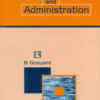PRESIDENT IN INDIAN POLITICAL SYSTEM
₹995.00 Original price was: ₹995.00.₹796.00Current price is: ₹796.00.
25 in stock
The Indian Presidency is a unique political phenomenon. It is neither exclusive like that of the British monarch nor inclusive like that of the American President. The founding fatheres of Indian Constitution neither endowed the Presidency with real executive powers, nor did they create it as a mere wooden figurehead. The office was intended to be an embodiment of stability, hallowed with great responsibility. It will not not be inappropriate to state that the Indian Presidency is like a steering wheel of the parliamentary machinery in the Indian political system.
In recent times, the unprecedented developments, twists and turns in the Indian political scene, such as the phenomena of hung parliament, the minority governments at the helm of affairs with uncertain outside props and the sudden fall of governments due to abrupt withdrawal of support, have made the role of the Indian Presidency very vital, decisive, challenging and even controversial at times.
This study not only discusses the scope and potentiality of the Indian Presidency but also finds out the functional instrumentality of this office in the unusual, political circumstances. Besides, it propagates the idea that this great political office, as envisaged by the founding fathers, is not absolute but subjected to growth to assume the new responsibilities as described by the political environment and compulsions of the country.
| Author's Name | |
|---|---|
| Binding | |
| Release Year | |
| Language | |
| Publisher |
Related products
Political Science
CRIMINAL JUSTICE ADMINISTRATION: The Relay Race for Criminal Justice
Political Science
Political Science
Political Science
Political Science
POLICE TRAINING IN COMMUNITY RELATIONS: Perspectives on the United States and India
Political Science
Political Science
Political Science











